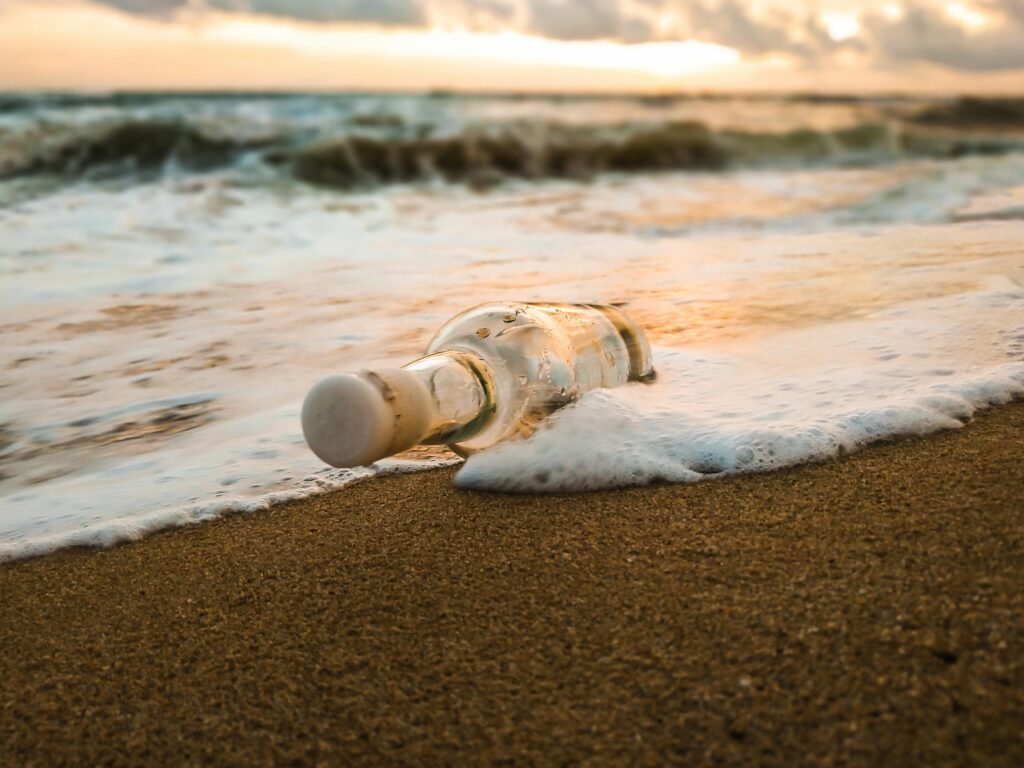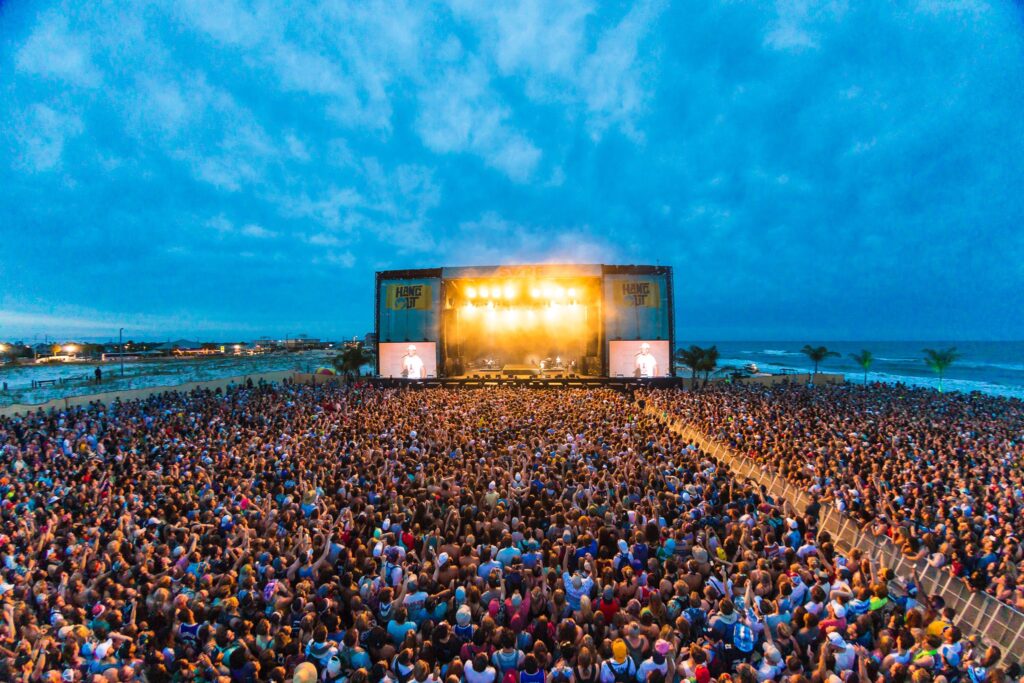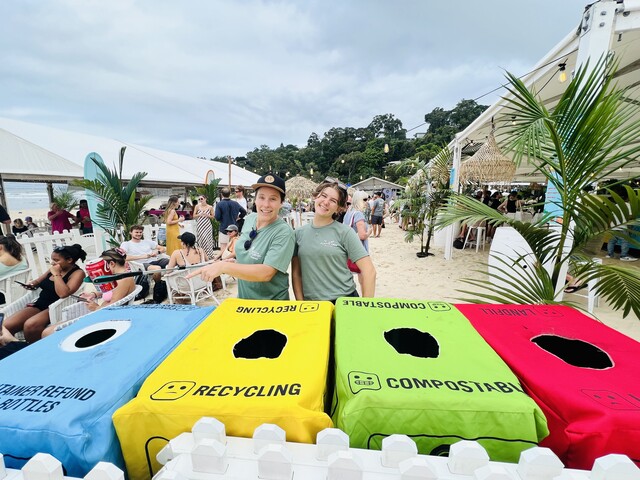Dressed up as spectacle and fun, concerts on the beach damage the ecosystem and the planet. They are not always sustainable, and they definitely contribute to destroying the quality of the sea. How? Let’s see it!

A cocktail of pollution
Flashing lights, live music, screaming euphoria and jumping up and down. There is no doubt that musical events are very exciting and even enriching, especially when enjoyed with friends or family. And what can you say when the backdrop is the ocean itself? The murmur of the waves, the smell of saltpetre, the breeze on your face, the sand between your toes and the music of the band merging with the voice of the sea… A real delight, unquestionably.
A delight that turns into a nightmare when it comes to measuring its effects on the environment, and perhaps this is precisely the real song that needs to be heard, explored and disseminated! It is not for nothing that much academic literature has taken the trouble to testify how each one of these concerts on the beach is a sea of problems. Something that Nando Cruz did in his book ‘Macrofestivales, el agujero negro de la música’ (Macrofestivals, the black hole of music). A danger that sometimes puts the safety of the attendees at risk; and that doesn’t leave the environment unscathed either. But let’s cut to the chase and talk about the evidence.
From noise pollution to rubbish in the sea
Did you know that in 2022 the live entertainment industry had a turnover of 459 million? And that’s just in ticket sales alone, almost 200% more than the previous year. A growth that also reached music tourism, according to data from the 2023 Live Music Yearbook, released by the APM, the Association of Music Promoters. An index that helped the industry to recover pre-pandemic levels, and which involved many open-air and seaside festivals.
They are unforgettable, but also costly, and not at the business level, exactly. For many experts, the main problem with beach concerts is the damage and risk they pose to the flora and fauna of the sea. A position that makes a lot of sense when you take into account the prancing and stomping of the crowds. Invasive footsteps that disturb and injure coastal vegetation. We are talking about plants that took years and years to grow, and that in the course of a few hours, if not minutes, end up dying and disappearing, crushed under so much human weight.
An abusive attitude against nature, no doubt, which is also compounded by the effect of intense spotlights and blaring sound. Incidentally, the sound and light intrusions confuse and disrupt the local species, or more precisely the habits of the fauna. In what way? By changing (and for the worse) their food menu, for example. By altering their mating and reproductive rhythms. And even spoiling their sleeping and resting times, without going any further.
It is the case of those birds that flee their nests and their familiar surroundings in an effort to escape bright lights, loud music and vibrations. After all, there is such a thing as noise pollution. A problem that, in the form of amplified sound, travels through the air and through the water until it reaches great distances from its point of origin, disturbing life beneath the sea in its wake.
Birds, fish and other underwater birds and creatures are forced and driven to change their behaviour patterns. The effects of noise and light pollution are getting worse and worse.
Another of the serious consequences caused by concerts on the beach is the rubbish generated and left behind by the attendees. This is obvious to see (and smell). A trail of waste that reduces the sand to a battlefield, unfortunately, with drink cans here, plastic or glass bottles there and food wrappers there.

Waste that spoils the natural landscape of the beaches, of course. But it also poses a threat to marine wildlife, no exaggeration. And why exactly? Because marine animals can end up eating it, which is certainly not part of their natural diet. Or get caught in them, in a deadly web of plastic, paper, aluminium and glass.
Dangerous impact on water and soil
It is said that music tames the wild beasts. But what is always kept quiet is that when it comes to beach concerts and other music festivals, it muddies the waters, churns the sands, and impacts the ecosystem of marine species. So much so that it actually increases greenhouse gas emissions. This, in turn, results in the suffocation of marine biodiversity.
And with so much rubbish and pollution and so much rubbish left behind, it is impossible not to sit back and think about how all this affects the most vital and primary source of all living things: water. A risky exposure that has led to exhaustive and expert looks that delve into the problem. The result? Studies of this size, whose lines put under analysis and microscope what happens on the ground and in the water when concerts on the beach come into action.
According to expert consensus, the influx of people, at least in massive numbers, ends up compacting the trampled earth. While this may seem insignificant, transitory and harmless, in practice it hides something much more serious beneath the surface. It is enough to see how these massive footprints open up a furrow in the strength of the sand itself to grasp the extent and danger of this problem.
This is a vulnerability that in turn weakens the capacity of the soil to filter water when the time comes. In other words, erosion occurs. A corrosion that, when added to and mixed with the beer, soft drinks and other beverages spilled during the furore of the concerts, combines and degenerates into a threat that penetrates the sand.
Liquids that sweeten the palate and cool the throat, true. But whose spilled preservatives, sugars and alcohol inevitably flow into the ocean. A spill that disrupts and damages both water quality and marine life. Tobacco, of course, as well as drugs and other noxious substances, are also a bomb of destruction.

Carbon-emitting concerts
The fuel and energy consumption of car travel is a major contributor to greenhouse gas emissions. So it would be delusional and illogical to think that this polluting evil is conspicuous by its absence at concerts on the beach.
It is very present indeed. According to a study by the consultancy Green Touring Network, each person attending a concert generates 5KG of C02. This can be traced back to the preparations for such events, without going any further, even if often only indirectly. Where? In the long distances travelled to attend mass events in general, and concerts on the beach in particular. Car, plane or boat journeys that increase the carbon footprint. In addition to the emissions exhaled by the sound systems and generators that also participate in these musical events.
Concerts on the beach: time to take action
Many marine species live exposed to a continuous and negative environmental impact. Those responsible? People. Or, to be more precise, human activity, which, in the form of crowds and pollution and plastic waste, enter their organisms and threaten their ecosystem.
That is why there is no way of sorting out which of the above-mentioned problems is the worst and which is the least. After all, the consequences of each of them are measured and counted in death and destruction to the ocean, its wildlife and its ecosystem. However, it is never too late to take action. And even if the problem is serious, urgent and obvious, it is a relief to know that there is still time to take action.

Ways to minimise the environmental footprint of concerts on the beach are challenging and yet by no means impossible. From more conscious education to reducing emissions and increasing recycling… It’s all a matter of getting down to work. The important thing is to always protect the flora and fauna of the sea. Because if all bad things stick, as the saying goes, who’s to say that good manners can’t also be contagious?
An idea that John Drury, David Novelli and Stott Clifford have already considered in their study on the positive and helpful features of crowd behaviour during an outdoor music event. The article, published in Psychology Today, also discusses when crowds become dangerous in these situations.
A way to start making beach concerts more sustainable?
The German consultancy Green Touring Network is clear about that, and it elaborates on it in its Universal Guide to Offsetting the Carbon Footprint, made and designed for musicians around the world. It argues that it is essential to mark out sensitive areas around the event venue, marking them as off-limits in order to protect vegetation and animals.
The use of sound effects to minimise the acoustic impact is also an important line of action. Or opt for solar or wind energy generators to power the sound equipment and lights. And the same goes for the choice of spotlights and other lighting materials, of course, with preference being given to softer lights or those that use renewable energy. Yes, those that do not disturb wildlife.
For the experts of the German consultancy firm, handing out (digital) brochures before the event is not a bad idea either, in order to inform people about the importance of caring for nature. And don’t forget to deliver the same message during the show. Or offer ticket discounts to those who show that they will be cycling or using public transport, or that they will be carpooling with other people. In short, they can choose to arrive with the help of other, more sustainable transport.
Another idea that can be implemented if you really want to do something about concerts on the beach is to recycle materials and reduce consumption. But what does this involve, exactly? Offering reusable cups, for example, in order to reduce single-use plastics. Or refill the cups for attendees with the drink they ask for, instead of giving them a bottle or can.
It wouldn’t hurt to set up recycling points in the area either, by the way. And it would be just as good to set up water refilling stations, of course. The important thing, in any case, is to ensure that each participant generates as little waste as possible. What’s more, if everyone cleans up their site before they leave (apart from cleaning up afterwards, in the area, of course) that would be a huge plus.

Caring for the ecosystem and love of music
Concerts on the beach are, in short, a spectacle with negative effects and an anti-ecological impact that cries out for effective measures. Yes, having fun to the sound of wind and waves and lots of voices in chorus is all very well. But that should not be a weapon against the sea. Especially when it is possible to enjoy the music and the spectacle while respecting the environment. The solution, in short, only requires a little more effort, commitment, planning and social awareness. Because if the sea belongs to all of us, the responsibility to protect and care for it must also belong to all of us.
Remember… Together we can do it!





